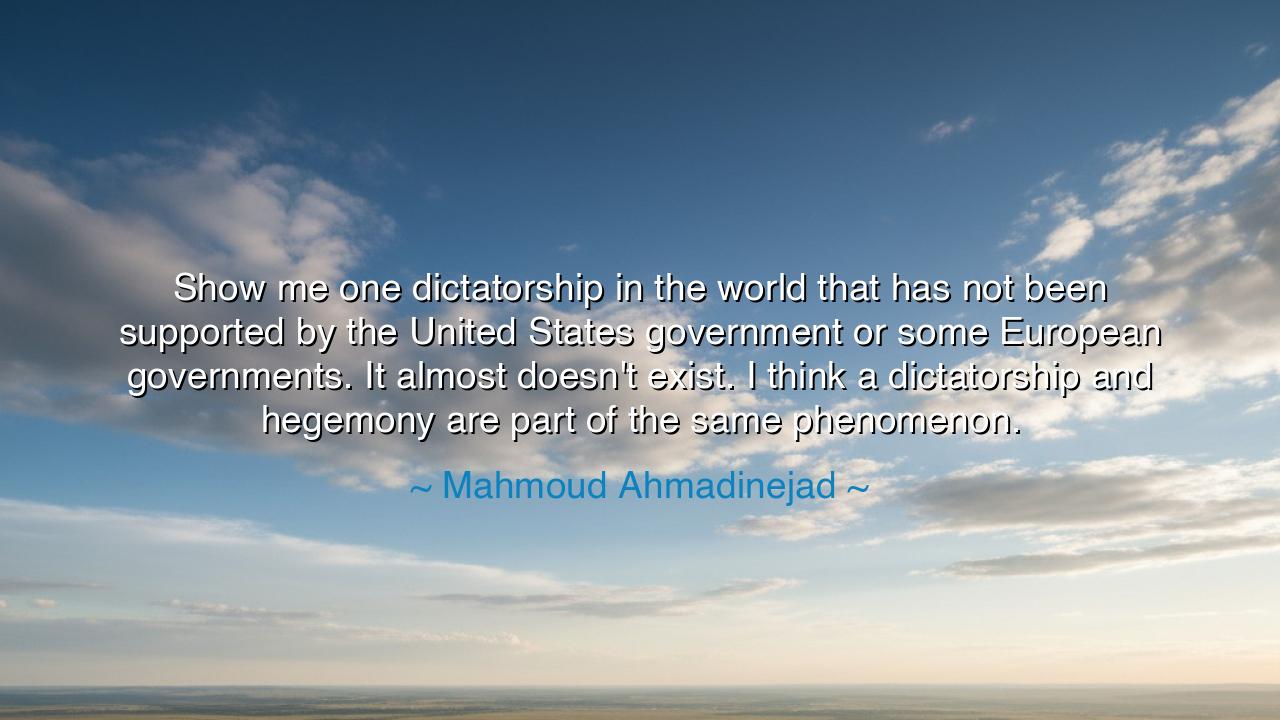
Show me one dictatorship in the world that has not been supported
Show me one dictatorship in the world that has not been supported by the United States government or some European governments. It almost doesn't exist. I think a dictatorship and hegemony are part of the same phenomenon.






“Show me one dictatorship in the world that has not been supported by the United States government or some European governments. It almost doesn’t exist. I think a dictatorship and hegemony are part of the same phenomenon.” Thus spoke Mahmoud Ahmadinejad, the former president of Iran, a man who, though controversial, gave voice to a truth that echoes through the corridors of history — a truth about the hidden kinship between power and domination, between dictatorship and hegemony. In these words burns both accusation and revelation. He speaks not merely as a critic of the West, but as a prophet of a recurring pattern in human affairs: that those who claim to defend liberty often nurture tyranny when it serves their interests, and that the pursuit of global control is the shadow twin of every empire that rises beneath the sun.
The origin of this quote arises from Ahmadinejad’s reflections on the modern world order — one shaped by the superpowers of the twentieth and twenty-first centuries. Having led a nation long at odds with the Western world, he spoke from a position of defiance against the political hypocrisy he perceived in global diplomacy. His words were forged in a climate of tension, where sanctions, interventions, and alliances often revealed a deeper truth: that the rhetoric of freedom is too often used as a veil for control. His statement is not a defense of tyranny, but an indictment of hegemony, the system through which great powers sustain their dominance not only by armies and weapons, but by influence, wealth, and selective support.
When Ahmadinejad declares, “Show me one dictatorship... that has not been supported,” he calls attention to the uncomfortable reality that many of the world’s most oppressive regimes have thrived under the protection of those who claim to stand for human rights. From Latin America’s Cold War dictatorships, propped up by Western powers in the name of anti-communism, to the autocracies of the Middle East, sustained by military aid and oil interests, history bears witness to this paradox. The claim of defending democracy abroad has often masked the preservation of influence and profit. Thus, Ahmadinejad’s charge that “dictatorship and hegemony are part of the same phenomenon” is a cry against the imperial mindset — the belief that the strong may shape the world in their image, even at the cost of others’ freedom.
Consider, for instance, the long shadow of Chile, where in 1973 the democratically elected president Salvador Allende was overthrown with covert support from foreign powers. In his place rose Augusto Pinochet, a dictator whose regime silenced dissent through terror and blood. Yet for years, his government was hailed as an ally of Western civilization, for it served the strategic interests of the powerful. So too in the deserts of the Middle East, monarchies and juntas have endured, their reigns unchallenged, because they guaranteed access to oil and stability for distant capitals. The pattern repeats across decades and continents — a silent covenant between dictatorship and hegemony, each feeding the other, each justifying its existence by the fear of chaos.
But Ahmadinejad’s words, though born of political anger, carry a deeper philosophical weight. He speaks to the moral blindness of empire — that great danger which arises when nations see themselves as the arbiters of justice. Every age has its Rome, its Britain, its America — powers that rise in the name of order and civilization, yet sow suffering in pursuit of their own dominion. The hegemony of the few becomes the despair of the many. The lesson here is not confined to geopolitics; it is the ancient warning that when power serves itself, it inevitably corrupts the very ideals it claims to protect.
Yet, his statement should not be heard only as condemnation. It is also a summons — a call for the awakening of moral courage among nations and individuals alike. If dictatorship and hegemony are indeed one phenomenon, then freedom must be their opposite: not a banner waved in conquest, but a principle lived in humility. To support the free, one must be free of domination; to uplift the oppressed, one must relinquish the hunger for control. The true test of civilization, Ahmadinejad implies, lies not in might or wealth, but in the capacity to stand for justice even when it yields no advantage.
Therefore, O listener, take this teaching to heart: beware the hypocrisy of power cloaked in virtue. Judge not nations by their speeches, but by their actions — by whether they lift up the weak or exploit them. Remember that every empire that claims to bring peace has, in its pride, also sown war. Let us learn from this cycle and break it: by standing for truth, not for dominance; for cooperation, not for coercion. The world needs less hegemony and more humanity — fewer masters, and more servants of justice.
For in the end, as history teaches and prophets remind us, no empire endures forever, but the conscience of mankind endures always. Those who build power upon oppression may command armies and wealth, but they cannot command the hearts of the people. The tide of history will sweep away both the tyrant and the hegemon, leaving only the memory of those who dared to speak truth, even in defiance of empires. And so, let us remember the wisdom in these words — that true greatness lies not in ruling the world, but in serving it.






AAdministratorAdministrator
Welcome, honored guests. Please leave a comment, we will respond soon